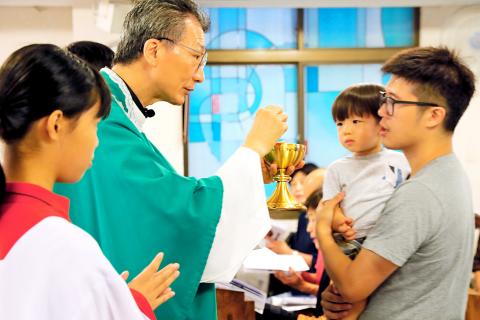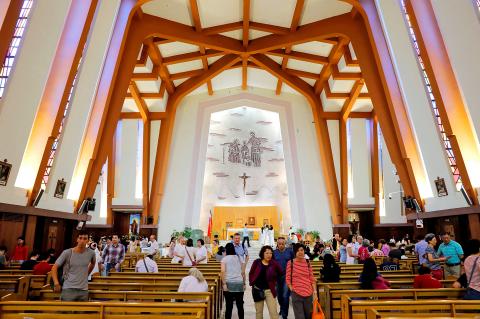Worshipers at Masses in Hong Kong and Taiwan yesterday were largely upbeat about a new deal between China and the Vatican, despite fears Beijing is trying to increase control over the Catholic Church.
Cardinal Joseph Zen (陳日君), the outspoken former bishop of Hong Kong, accused Vatican officials of “selling out” ahead of Saturday’s agreement and in a blog post shortly after the announcement he raised concern over its impact.
“What will the government say to Catholics in China? ‘Obey us, the Holy See is already in agreement with us?’” the cardinal wrote.

Photo: Daniel Shih, AFP
Comments on social media accused the Vatican of turning a blind eye to a “silent cultural revolution” in China, where churches have been destroyed in recent months and there has been a clampdown on Bible sales.
However, churchgoers in Hong Kong gave the deal a cautious welcome.
A parishioner who gave her name as Teresa at the Cathedral of the Immaculate Conception in Hong Kong said: “More contact is positive,” adding that she was not worried warming ties between Beijing and the Vatican would lead to interference in the territory’s Catholic churches.

Photo: Daniel Shih, AFP
Another who gave her name as Nikki said: “Any cooperation between the two sides has to be a good thing, as long as it’s equal cooperation.”
In Taiwan, some worshipers worried the new deal meant the nation would lose its only official ally in Europe.
Online comments on the Liberty Times (the Taipei Times’ sister newspaper) Facebook page accused the Vatican of “dealing with the devil,” but churchgoers remained confident.
“I think the pope’s consideration in signing the agreement is to promote religious freedom rather than establishing diplomatic relations with China, so there is no need to politicize him,” said parishioner Yuan Shi-min at Our Lady of Fatima in Taipei.
China’s 12 million Catholics are divided between a state-run association whose clergy are chosen by the government and an unofficial church that swears allegiance to the pope.
The agreement struck on Saturday was aimed at resolving a decades-old dispute over who gets to name Catholic bishops in China, and could lead to a rapprochement for the first time since diplomatic ties were severed in 1951.
Shortly after the deal was announced, Pope Francis recognized seven clergy appointed by Beijing.
China’s state-supervised Catholic Patriotic Association yesterday reaffirmed its loyalty to the Chinese Communist Party, while welcoming the deal.
The Catholic Church in China said it would “persevere to walk a path suited to a socialist society, under the leadership of the Chinese Communist Party.”
It “deeply loved the motherland” and “sincerely endorsed” the agreement, hoping relations between China and the Vatican would improve further, it added in comments on its Web site.
Additional reporting by Reuters

CHAOS: Iranians took to the streets playing celebratory music after reports of Khamenei’s death on Saturday, while mourners also gathered in Tehran yesterday Iranian Supreme Leader Ayatollah Ali Khamenei was killed in a major attack on Iran launched by Israel and the US, throwing the future of the Islamic republic into doubt and raising the risk of regional instability. Iranian state television and the state-run IRNA news agency announced the 86-year-old’s death early yesterday. US President Donald Trump said it gave Iranians their “greatest chance” to “take back” their country. The announcements came after a joint US and Israeli aerial bombardment that targeted Iranian military and governmental sites. Trump said the “heavy and pinpoint bombing” would continue through the week or as long

TRUST: The KMT said it respected the US’ timing and considerations, and hoped it would continue to honor its commitments to helping Taiwan bolster its defenses and deterrence US President Donald Trump is delaying a multibillion-dollar arms sale to Taiwan to ensure his visit to Beijing is successful, a New York Times report said. The weapons sales package has stalled in the US Department of State, the report said, citing US officials it did not identify. The White House has told agencies not to push forward ahead of Trump’s meeting with Chinese President Xi Jinping (習近平), it said. The two last month held a phone call to discuss trade and geopolitical flashpoints ahead of the summit. Xi raised the Taiwan issue and urged the US to handle arms sales to

State-run CPC Corp, Taiwan (CPC, 台灣中油) yesterday said that it had confirmed on Saturday night with its liquefied natural gas (LNG) and crude oil suppliers that shipments are proceeding as scheduled and that domestic supplies remain unaffected. The CPC yesterday announced the gasoline and diesel prices will rise by NT$0.2 and NT$0.4 per liter, respectively, starting Monday, citing Middle East tensions and blizzards in the eastern United States. CPC also iterated it has been reducing the proportion of crude oil imports from the Middle East and diversifying its supply sources in the past few years in response to geopolitical risks, expanding

OTHER OPTIONS: Given possible US intervention and Taiwanese counterattacks, China might opt to blockade Taiwan or take its outlying islands instead of an all-out invasion A US think tank has urged Taiwan to adopt a “hellscape” strategy that would flood the Taiwan Strait with drones and other uncrewed systems to deter invasion by China. In its report, Hellscape for Taiwan, published on Thursday, the Center for a New American Security said Taipei’s asymmetric defense approach — often described as a “porcupine strategy” — needs to evolve to keep pace with the growing capabilities of the Chinese People’s Liberation Army. The “hellscape” strategy involves saturating the air and waters around Taiwan with thousands of drones and other platforms capable of striking invading forces from multiple domains at once. Long-range